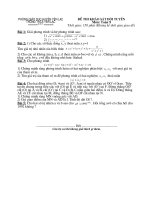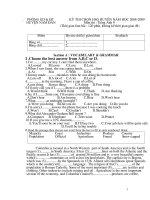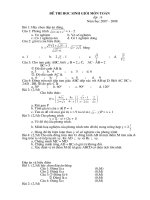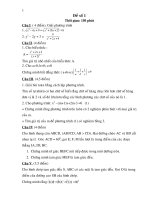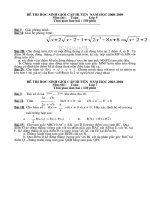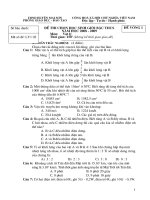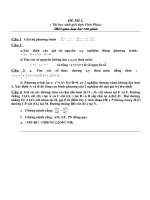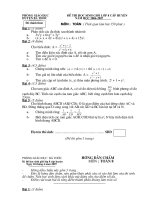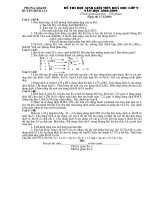De thi HSG AV 9 20072008
Bạn đang xem bản rút gọn của tài liệu. Xem và tải ngay bản đầy đủ của tài liệu tại đây (169.56 KB, 11 trang )
<span class='text_page_counter'>(1)</span><div class='page_container' data-page=1>
SỞ GIÁO DỤC VÀ ĐÀO TẠO <b>KỲ THI CHỌN HỌC SINH GIỎI LỚP 9</b>
GIA LAI Năm học: 2007- 2008
<b> MÔN THI : TIẾNG ANH</b>
<b> ĐỀ CHÍNH THỨC</b> Thời gian: 150 phút <i>(không kể thời gian phát đề)</i>
<i>Họ và tên chữ kí của hai giám khảo</i>
1. ...
2. ...
<b>Số mật mã</b>
<i>Điểm bài thi (bằng số và bằng chữ)</i>
<b>ĐỀ BÀI:</b>
<b>Section 1: Listening (4ms)</b>
<b>Part 1.</b> (Question 1-5)
You will hear five short conversations. You will hear each conversation twice. There is
one question for each conversation. For questions 1-5 put a tick () under the right
answer.
<i><b>Example:</b></i>
0. How many people were at the meeting?
1. Where is the woman going to go on holiday this year?
</div>
<span class='text_page_counter'>(2)</span><div class='page_container' data-page=2>
<b>D</b>
3. What will the weather be like?
4. How far is the nearest supermarket?
5. Which table does Sally like?
<b>Part 2.</b> (Questions 6-10)
Listen to Tom talking to a friend about a sports afternoon.
What sport did each person do?
For questions 6-10, write a letter (A-H) next to each person. You will hear the
conversation twice.
<i><b>Example:</b></i>
0. Tom
<b>People</b> <b>Sports</b>
6. Sam A. basketball
7. Jane B. football
8. Paul C. golf
9. Susan D. horse-riding
10. Anne E. skiing
</div>
<span class='text_page_counter'>(3)</span><div class='page_container' data-page=3>
<b>Part 3.</b> (Questions 11-15)
Listen to Jenny talking to Mark about buying a computer game.
For questions 11-15, tick () A, B or C. You will hear the conversation twice.
<i><b>Example:</b></i>
0. The name of the computer game is A City 2010
B City 2001
C City 2100
11. The game is <b>not</b> good for people under A eight
B ten
C twelve
12. Black’s PC shop is in A Cambridge
B London
C Peterstown
13. The address of the shop is A 29 Hunter Road
B 29 Walker Street
C 29 Marsden Street
14. The last day you can get a free game is A Monday
B Thursday
C Friday
15. The computer game cost A £26
B £30
C £48
<b>Part 4.</b> (Questions 16-20)
You will hear a man asking for information about a train.
Listen and complete questions 16-20. You will hear the conversation twice.
<b> Train</b>
To: <i>Newcastle</i>
16. Day of journey: _____________________________
17. Train leaves at: _____________________________
18. Return ticket costs: _____________________________
19. Food on train: <i>Drinks and</i> ____________________
</div>
<span class='text_page_counter'>(4)</span><div class='page_container' data-page=4>
<b>Section ii: use of English (6ms)</b>
<b>Part 1. </b>(4ms) GRAMMAR AND VOCABULARY
<b>Circle the best answer (a, b, c, or d) for each of the following sentences.</b>
1. The children ________ to stay up late.
a. don’t allow b. aren’t allowed c. aren’t let d. don’t let
2. The reported speech of “How far is it to the station?” is:
a. She asked me how far is it to the station.
b. She asked me how far it is to the station.
c. She asked me how far was it to the station.
d. She asked me how far it was to the station.
3. I used ________ running every morning, but I don’t go now.
a. go b. to go c. going d. gone
4. Janet promised ________ anyone what I’d said.
a. not tell b. not telling c. not to tell d. to not tell
5. How about _________ badminton at weekend?
a. play b. to play c. playing d. played
6. I’ve got _________ idea where Mike is.
a. none b. none of c. no d. any
7. Leave me alone or I _________ the police.
a. Can call b. could call c. will call d. would
8. Thank you for letting me use your new computer. I ________very
careful with it.
a. will be b. would be c. could be d. can be
9. “I’d love to pass the entrance examination”. “You _________.”
a. have to be hardworking c. must work harder
b. will work hard d. a and c are correct
10. Some people __________ there is life on other planets.
a. are believing b. are believed c. believes d. believe
11. We’ll go for a picnic tomorrow if the weather _________ nice.
a. will be b. would be c. is d. were
12. “I __________ Sally a Walkman for her birthday”.
“She’s already got one”
“Has she? Well. I ________ her a new Digital camera.”
a. ought to buy - am going to buy c. am going to buy - will buy
b. will buy - can buy d. need to - buy
13. “Drive carefully. It _________ heavily outside.”
“I will. It often _________ hard this time of the year”
a. is raining - rains c. will rain - is raining
b. rains - is going to rain d. rains - is raining
14. “What do you think of my new bike?” “ __________.”
a. I think a lot c. I don’t think so
</div>
<span class='text_page_counter'>(5)</span><div class='page_container' data-page=5>
a. Please accept it with my best wishes c. Sure, go ahead
b. Yes, do it yourself d. That’s all right. Never mind
16. “Would you mind moving your bag from the seat?” “___________.”
a. I can’t, I’m afraid c. Oh, sorry
b. No, I wouldn’t d. It was nothing, really
17. “I wish you wouldn’t smoke in here.” “____________.”
a. I don’t agree, I’m afraid c. Sorry, shall I open the window?
b. I believe I couldn’t d. Don’t worry, I didn’t bother
18. Parents have to <b>bring up</b> their children carefully. “B<b>ring up</b>” means:
a. Look at and take care c. Look for and feed
b. Look after and educate d. Look forward and hope
19. Those students have been said to <b>get along </b>with their form teacher.
“<b>Get along” </b>in this sentence means:
a. Have good relations c. Be in troubles
b. Meet by chance d. Respect
20. What do you _________ to be doing in ten years time?
a. begin b. expect c. remember d. suggest
<b>Part 2.</b> (1ms) Error recognition.
<b>Circle the letter (a, b, c or d) from the underlined part which is not</b>
<b> in good use of English:</b>
1. You must work hardly if you want to be a doctor in the future.
(a) (b) (c) (d)
2. They learn English as well as other languages by listening, copying what
(a) (b)
they hear, and use the language.
(c) (d)
3. He says that he is thinking of going study English in Australia.
(a) (b) (c) (d)
4. Gas is consumed faster than it produced.
(a) (b) (c) (d)
5. John has his brother done the housework for him. He doesn’t have much time.
(a) (b) (c) (d)
<b>Part 3.</b> (1ms) PHONETICS.
<b>Circle the letter (a, b, c or d) before the word which is pronounced (1-7) </b>
<b>or stressed (8-10) differently from the others in the same line.</b>
1. a. uniform b. underwear c. universal d. union
2. a. encourage b. envelope c. entertainment d. entrance
3. a. weave b. jeans c. wears d. heat
4. a. used b. passed c. remembered d. computerized
5. a. interviews b. laughs c. ploughs d. climbs
</div>
<span class='text_page_counter'>(6)</span><div class='page_container' data-page=6>
7. a. houses b. potatoes c. mangoes d. canoes
8. a. interesting b. mountainous c. hamburger d. engineer
9. a. unique b. unity c. usual d. union
10. a. newspaper b. time-consuming c. teenager d. Internet
<b>Section III: READING (4ms)</b>
<b>Part 1.</b> (2ms)
<b>Read the following passage then answer the questions:</b>
Jane was one of those students who have problems with writing. First, her handwriting
was so bad that most teachers couldn’t read it. The letters were so small that the words
were extremely difficult to read. Even though she tried to change her handwriting, she
felt discouraged. Secondly, she made so many mistakes in spelling and punctuation that
her work always had a bad impression. As well as this, she had problems with
organizing her writing, making plans and writing notes. One day, though, she took a
Goodwriter writing course to learn how to be an effective writer. At Goodwriters we
taught her how to organize her ideas. Although she found it difficult at first, she soon
made progress. She learned to revise her writing so as to improve it. She started reading
so much that her spelling improved; her handwriting became clearer, too.
Goodwriters…send for details today!
<b>Questions:</b>
1. What was the problem with Jane?
a. Her hand didn’t work properly. c. The words she wrote could hardly be read.
b. Her letters couldn’t be found. d. The mistakes she made discouraged her.
2. How could she overcome her problem?
a. By participating in a training course. c. By training herself afterward.
b. By learning from friends. d. a and c are correct answers.
3. Which statement is <b>not</b> true to the passage?
a. Jane had many problems with her handwriting at first.
c. Jane didn’t want to train to become an effective writer.
b. Goodwriters was very effective in training writing skill.
d. Reading could make her spelling improved.
4. What is the author trying to do?
a. To tell a story about Jane’s job. c. To advise Jane to join in Goodwriters.
b. To complain about Jane’s mistakes. d. To advertise Goodwriters.
5. Write one suggested <b>title</b> for this reading passage:
</div>
<span class='text_page_counter'>(7)</span><div class='page_container' data-page=7>
<b>---Part 2.</b> (2ms)
<b>Read the following passage then fill in each blank with the right form of the word</b>
<b>in brackets.</b>
Hoping to avoid the “grow first, clean up later” pattern that most Asian (1)_________
(country) have followed, Vietnam decided several years ago (2)_________ (tighten) its
lax vehicle emissions laws.
But after numerous missed deadlines and sparring between government ministries,
(3) ___________ (environment) groups now say air (4) __________ (pollute) in
Vietnam could get (5) __________ (bad) before it gets better.
The air in Hanoi and Ho Chi Minh City contains (6) ___________ (danger) levels of
benzene and sulfur dioxide, experts say. Levels of one of the most dangerous
(7) ___________ (pollute), microscopic dust known as PM10, are moderate compared
with other (8) ___________ (develop) Asian cities but could worsen if Vietnam chooses
(9) ___________ (build) coal-fired power plants to satiate demand for electricity, which
is (10) __________ (grow) at double-digit annual rates.
<b>Section Iv: Writing (6ms)</b>
<b>Part 1. </b>(2ms)
<b>Rewrite the following sentences beginning with the words guided:</b>
1. Rainfall in Britain has been light this year.
Britain’s ____________________________________________________________
2. “You’ve passed your final examination, Jane! Well done!”
Carol congratulated Jane _________________________________ final examination.
3. It would be a good idea to stop drinking beer. <b>(give up)</b>
It would be a good idea _____________________________________________beer.
4. She said that she only wanted a cup of coffee for breakfast.
She said that all she _________________________________________for breakfast.
5. “Do you like English food?”
That English man asked ________________________________________________.
6.“What other languages can you speak?”, then, he asked.
Then, he asked _______________________________________________________.
7. You are offered to make 2 wishes. Now, do as you’re guided:
- Introduce yourself (one or two lines; your name is <b>Sincerely</b>)
- Make two (2) wishes.
- Write thank you and sign <b>Sincerely</b> at the end.
</div>
<span class='text_page_counter'>(8)</span><div class='page_container' data-page=8>
<b>Part 2.</b>Composition. (4ms)
In not more than 150 words, write about things you like and dislike in or around the
place you live. What the causes for those you like or dislike are, and what you
suggest to make these things better (if any).
Your writing must be in three (3) parts:
- Opening
- Body
- Conclusion
____________________________________________________________________
____________________________________________________________________
____________________________________________________________________
____________________________________________________________________
____________________________________________________________________
____________________________________________________________________
____________________________________________________________________
____________________________________________________________________
____________________________________________________________________
____________________________________________________________________
____________________________________________________________________
____________________________________________________________________
____________________________________________________________________
____________________________________________________________________
____________________________________________________________________
____________________________________________________________________
____________________________________________________________________
____________________________________________________________________
____________________________________________________________________
____________________________________________________________________
____________________________________________________________________
____________________________________________________________________
____________________________________________________________________
____________________________________________________________________
____________________________________________________________________
____________________________________________________________________
____________________________________________________________________
____________________________________________________________________
____________________________________________________________________
____________________________________________________________________
</div>
<span class='text_page_counter'>(9)</span><div class='page_container' data-page=9>
---SỞ GIÁO DỤC – ĐÀO TẠO GIA LAI <b>KỲ THI CHỌN HỌC SINH GIỎI LỚP 9</b>
<b>NĂM HỌC 2007 – 2008</b>
<b>---ĐÁP ÁN VÀ HƯỚNG DẪN CHẤM</b>
Môn : TIẾNG ANH
<b>Section 1 Listening</b> <b>(4ms)</b>
<b>Part 1.</b> 0,2 X 5 = 1m
1 C (Turkey)
2 B (Eleven)
3 A (Snow)
4 B (3km)
5 C (Square table)
<b>Part 2</b>. 0,2 X 5 = 1m
6 E (Skiing)
7 H (Volleyball)
8 C (Golf)
9 B (Football)
10 F (Table tennis)
<b>Part 3.</b> 0,2 X 5 = 1m
11 A (Eight)
12 B (London)
13 C (29 Marsden Street)
14 C (Friday)
15 A (£48)
<b>Part 4.</b> 0,2 X 5 = 1m
16 Tuesday
17 11.30/ half past eleven/ eleven thirty
18 £40/ forty pounds
19 sandwich (<i>es</i>)
20 (22) Mallet (Street)
<b>Section 2: use of english (6ms)</b>
<b>Part 1.</b> (4ms)
1. b The children aren’t allowed to stay up late.
2. d She asked me how far it was to the station.
3. b I used to go running every morning, but...
4. c Janet promised not to tell...
5. c How about playing...
6. c I’ve got no idea where....
7 c Leave me alone or I will call....
8 a ... I will be very careful...
</div>
<span class='text_page_counter'>(10)</span><div class='page_container' data-page=10>
11. c ....if the weather is nice.
12. c. I am going to buy - I will buy ...
13. a. It is raining heavily ....- It often rains hard...
14. b. It’s all right, I suppose.
15. c. Sure, go ahead.
16. c Oh, sorry.
17. c Sorry, shall I open the window?
18. b Look after and educate.
19. a Have good relations.
20. b ...expect to be doing....
<b>Part 2</b> (1m) 0,2 x 5 = 1m
1. b hardly (hard)
2. d use (using)
3. c study (studying)
4. d produced (is produced)
5. c done (do)
<b>Part 3</b> (1m) 0,2 x 5 = 1m
1. b underwear
2. a encourage
3. c wears
4. b passed
5. b laughs
6. a ancient
7. a houses
8. d engineer
9. a unique
10. b time-consuming
<b>Section III Reading</b> <b>(4ms)</b>
<b>Part 1</b> (2ms) 0,4 x 5 = 2ms
1. c The words she wrote could hardly be read.
2. d By participating in .../ By training herself afterward.
3. c Jane was too disappointed to become...
4. d To advertise Goodwriters
5. Goodwriters, Effective Writing Course.
<b>Part 2</b> (2ms)
</div>
<span class='text_page_counter'>(11)</span><div class='page_container' data-page=11>
8. developing
9. to build
10. growing
<b>Section IV Writing</b> <b>(6ms)</b>
<b>Part 1.</b> (2ms) 0,2 x 10 = 2ms
1. Britain’s rainfall has been light this year.
2. Carol congratulated Jane on passing her final examination.
3. It has been a good idea to give up drinking beer.
4. She said that all she wanted was a cup of coffee for breakfast.
5. That Englishman asked me if/whether I liked English food.
6. Then he asked what other languages I could speak.
7. Suggested answer:
a- My name is Sincerely. I am a student.
b- I wish I were lucky all my life.
c- I wish I could do what I want to.
d- Thank you for bringing me good luck for my life.
Sincerely
<b>Part 2.</b> Composition (4ms)
The writing must be in three parts: Introduction - Body - Conclusion.
Not more than 2 grammar or spelling mistakes.
Students are able to use good English, express their ideas clearly, and give
good suggestions.
</div>
<!--links-->
